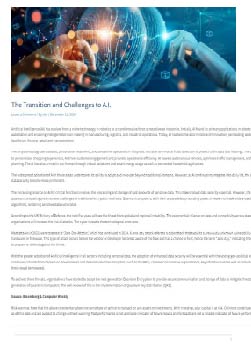Artificial Intelligence (AI) has evolved from a niche technology in robotics to a transformative force across diverse industries. Initially, AI found its primary applications in robotics, enhancing automation and enabling intelligent decision-making in manufacturing, logistics, and industrial operations. Today, AI has become a cornerstone of innovation, permeating sectors such as healthcare, finance, retail, and transportation.
The AI systems diagnose diseases, personalise treatments, and streamline operations in hospitals. It is able to enhance fraud detection to protect client data and holdings. The dynamic pricing to personalised shopping experiences, AI drives customer engagement and provides operational efficiency. AI powers autonomous vehicles, optimises traffic management, and improves route planning. The AI has also arrived in our homes through virtual assistants and smart energy usage as well as connected household appliances.
The widespread adoption of AI in these areas underscores its ability to adapt and innovate beyond traditional domains. However, as AI continues to integrate into daily life, the challenges of data security become more prominent.
The increasing reliance on AI for critical functions involves the processing and storage of vast amounts of sensitive data. This makes robust data security essential. However, the emergence of quantum computing presents new challenges to traditional encryption methods. Quantum computers, with their unparalleled processing power, threaten to break widely-used cryptographic algorithms, rendering sensitive data vulnerable.
According to the UK Ministry of Defence, the next five years will see the threat from global and regional instability. The exponential reliance on data and connectivity across states and organisations will increase the risk of attacks. The cyber threat is the technological arms race.
Most attacks in 2023, were targeted at ‘Zero-Day Attacks’, which has continued in 2024. A zero-day attack refers to a cyberattack that exploits a previously unknown vulnerability in software, hardware, or firmware. This type of attack occurs before the vendor or developer becomes aware of the flaw and has a chance to fix it, hence the term “zero-day,” indicating there are zero days to prepare or defend against the threat.
With the greater adoption of Artificial Intelligence in all sectors, including personal data, the adoption of enhanced data security will be essential with the lasting geo-political tensions and continuous threats from hackers on Governments and defence industries, hospitals (such as the NHS), commercial sensitive organisations, key infrastructures as well as individual data where these could be misused.
To address these threats, organisations have started to adopt the next-generation Quantum Encryption to provide secure communication and storage of data to mitigate threats from next generation of Quantum Computers. The well-known of this is the implementation of Quantum Key Distribution (QKD).
Source: Bloomberg & Computer Weekly
Risk warning: Note that the above commentary does not constitute an advice to transact on any assets or investments. With investing, your capital is at risk. Opinions constitute our judgement as of this date and are subject to change without warning. Past performance is not a reliable indicator of future results and forecasts are not a reliable indicator of future performance.

